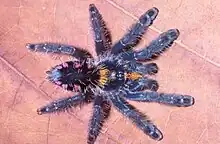| Typhochlaena costae | |
|---|---|
 | |
| Scientific classification | |
| Domain: | Eukaryota |
| Kingdom: | Animalia |
| Phylum: | Arthropoda |
| Subphylum: | Chelicerata |
| Class: | Arachnida |
| Order: | Araneae |
| Infraorder: | Mygalomorphae |
| Family: | Theraphosidae |
| Genus: | Typhochlaena |
| Species: | T. costae |
| Binomial name | |
| Typhochlaena costae Bertani, 2012[1] | |
Typhochlaena costae is a species of tarantula in the family Theraphosidae, subfamily Aviculariinae. It is native to Palmas, Tocantins state, Brazil.[2] The species shows an arboreal trapdoor lifestyle.[3]
Taxonomy
Typhochlaena costae was first described by Rogério Bertani in 2012.[1] The specific name honors Miriam Costa, who collected the holotype and several other spider taxa during her several years at Instituto Butantan.[4]
Characteristics
Typhochlaena costae is known from males and females. The male has a thinner and shorter embolus than other Typhochlaena species. The female has non-spiraled spermathecae, which diverge in the basal sections and are quite long. In both genders the abdomen is black, with three red spots laterally. The chelicerae and the very most anterior dorsal edge of the cephalothorax (which is otherwise brown) have long, and very stiff setae.[2]
References
- 1 2 "Taxon details Typhochlaena costae Bertani, 2012", World Spider Catalog, Natural History Museum Bern, retrieved 2016-01-13
- 1 2 Bertani, R. (2012). "Revision, cladistic analysis and biogeography of Typhochlaena C.L. Koch, 1850, Pachistopelma Pocock, 1901 and Iridopelma Pocock, 1901 (Araneae, Theraphosidae, Aviculariinae)". ZooKeys (230): 1–94. doi:10.3897/zookeys.230.3500. PMC 3494022. PMID 23166476.
- ↑ Andre C. & Hüsser M. 2018. About trapdoors and bridges - New insights in the little-known ecology and lifestyle of the genus Typhochlaena C.L. Koch, 1850. British Tarantula Society Journal 32(3): 3-29.
- ↑ "Typhochlaena costae". Tarantupedia. Retrieved 2016-01-13.